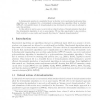Free Online Productivity Tools
i2Speak
i2Symbol
i2OCR
iTex2Img
iWeb2Print
iWeb2Shot
i2Type
iPdf2Split
iPdf2Merge
i2Bopomofo
i2Arabic
i2Style
i2Image
i2PDF
iLatex2Rtf
Sci2ools
SIGACT
2010
2010
Typically-correct derandomization
A fundamental question in complexity theory is whether every randomized polynomial time algorithm can be simulated by a deterministic polynomial time algorithm (that is, whether BPP=P). A beautiful theory of derandomization was developed in recent years in attempt to solve this problem. In this article we survey some recent work on relaxed notions of derandomization that allow the deterministic simulation to err on some inputs. We use this opportunity to also provide a brief overview to some results and research directions in “classical derandomization”.
Deterministic Polynomial Time | Polynomial Time Algorithm | Randomized Polynomial Time | SIGACT 2010 |
| Added | 30 Jan 2011 |
| Updated | 30 Jan 2011 |
| Type | Journal |
| Year | 2010 |
| Where | SIGACT |
| Authors | Ronen Shaltiel |
Comments (0)

